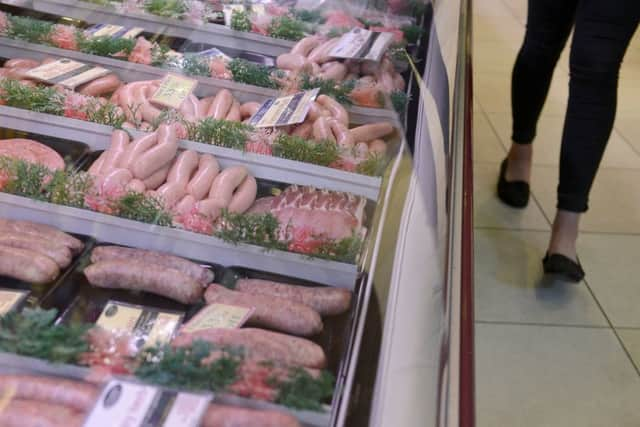Processed meat ranked alongside smoking as cancer cause


The World Health Organisation (WHO) has published a report today which found that processed meats that have been transformed through salting, curing or smoking were carcinogenic to humans.
It also found red meat was “probably” carcinogenic, with associations to bowel cancer, pancreatic cancer and prostate cancer.
Advertisement
Hide AdAdvertisement
Hide AdThe International Agency for Research on Cancer (IARC), the cancer agency of the WHO, said: “Processed meat was classified as carcinogenic to humans, based on sufficient evidence in humans that the consumption of processed meat causes colorectal cancer.”
This classification is the highest of five possible rankings, shared with alcohol, asbestos, arsenic and cigarettes.
The experts concluded that each 50 gram portion of processed meat eaten daily increases the risk of colorectal cancer by 18 per cent.
“For an individual, the risk of developing colorectal cancer because of their consumption of processed meat remains small, but this risk increases with the amount of meat consumed,” said Dr Kurt Straif, Head of the IARC Monographs Programme.
“In view of the large number of people who consume processed meat, the global impact on cancer incidence is of public health importance.”
The World Cancer Research Fund (WCRF) has warned for several years that there is “strong evidence” that consuming a lot of red meat can cause bowel cancer while even small quantities of processed meats can increase cancer risk.
One possible reason is that the compound that gives red meat its colour, known as haem, may damage the lining of the bowel.
In addition, when meat is preserved by smoking, curing or salting, or by adding preservatives, cancer-causing substances - called carcinogens - can be formed.
Advertisement
Hide AdAdvertisement
Hide AdStudies also show that people who eat a lot of red meat tend to eat fewer plant-based foods that protect against cancer.
Dr Ian Johnson, nutrition researcher and Emeritus Fellow at the Institute of Food Research, said: “IARC has concluded that the evidence in favour of an association between processed meat consumption and cancer, probably because of the ingredients used in processing, meets their criteria for placing this class of foods on the list of recognised human carcinogens.
“It is important to emphasise however that this classification reflects the strength of the evidence for an effect, not the actual size of the risk.
“Meat consumption is probably one of many factors contributing to the high rates of bowel cancer seen in America, Western Europe and Australia, but the mechanism is poorly understood, and the effect is much smaller than, for example, that of cigarette smoking on the risk of lung cancer.
“It is also worth noting that there is little or no evidence that vegetarians in the UK have a lower risk of bowel cancer than meat-eaters.”
The findings were criticised by some scientists, who said it was “ridiculous” to compare eating red meat to smoking.
Professor Robert Pickard, emeritus professor of neurobiology at Cardiff University and a member of the Meat Advisory Panel, which is funded by the meat industry, said: “Red and processed meat do not give you cancer and actually the IARC report is not saying that eating processed meat is as harmful as smoking.
“In fact comparing red meat to smoking is ridiculous.
“Looking at the report itself I am very surprised by IARC’s strong conclusion on categorising processed red meat as definitely and red meat as being probably carcinogenic to humans given the lack of consensus within the scientific community and the very weak evidence regarding the causal relationship between red meat and cancer.
Advertisement
Hide AdAdvertisement
Hide Ad“There are many substances classed as carcinogenic such as air pollution, contraceptive pills and working as a painter.
“Interestingly IARC has even noted coffee, working as a hair dresser and shift working in the same category as red meat.”
People in the UK eat around 17g of processed meat each day, said Prof Pickard, so would need to consume three times that amount to increase their cancer risk.
He added: “Avoiding red meat in the diet is not a protective strategy against cancer. The top priorities for cancer prevention remain smoking cessation, maintenance of normal body weight and avoidance of high alcohol intakes.
“Red meat has a valuable role within a healthy, balanced diet thanks to its high protein content and rich nutritional composition.”
‘If you look after yourself, a bit of processed meat won’t do you harm or give you cancer’
There was mixed reaction from people in Edinburgh over the meat warning.
Sandy Crombie, of the award-winning Crombie’s Butchers in the city’s Broughton Street, said “People have to think about what processed meat is as processed meats are all different.
Advertisement
Hide AdAdvertisement
Hide Ad“The British sausage in general is not what this report is talking about. Continental sausages contain nitrates, British sausages do not.”
Iain Fraser, 42, from Belvue, agreed, saying: “I think the whole ‘everything in moderation’ thing applies here.
“I won’t change my eating habits after hearing the news. However, I do think about it for my kids – I have a three and six-year-old and I will educate them on healthy eating and processed meat consumption.”
Sheila Hunter, of Derrick’s Take Away Cafe, said: “I neither agree nor disagree. Next week what will it be?
“What can you eat? Instead of blaming different foods, why not put the effort and research into Cancer Research?”
She added: “And by the way I have sold an abundance of bacon rolls this morning after the warning news came out.”
Agniesska Biewak, 36, from Leith, said: “If we are cooking meat we try to give the children fresh meat anyway.
“However, I don’t think a little bit of processed meat will do any harm.”
Clemence Alasseur, 24, of Leith, agreed, saying “If you look after yourself, a little bit of processed meat won’t do you any harm or give you cancer.”